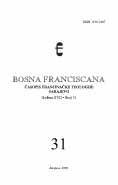'Narod knjige' (ahl al-kitâb): Kršćani i Židovi u svijetu klasičnog islama
'People of the Book' (ahl al-kitâb): Christian and Jews in the World of Classical Islam
Author(s): Vjeran KursarSubject(s): Christian Theology and Religion
Published by: Franjevačka teologija Sarajevo
Summary/Abstract: The emergence of Islam was followed by its extraordinary success and spread over vast territories stretching from Spain in the west to India and central Asia in the east. The consequence of the conquest was incorporation of vast masses of non-Muslim peoples into the Islamic state. According to Islamic law, mankind is basically divided into believers and non-believers, i.e. Muslims and non-Muslims. Non-Muslims are further divided to those who posses a revealed religion, called People of the Book (ahl al-kitâb), and polytheists (muşrikûn). In order to become a subject recognizable by the law, one has to be a believer, i.e., a Muslim, or a follower of one of revealed religions, which are Christianity and Judaism. Members of the recognized religions are divided into those living in the Land of Islam (dâr al-Islâm) and those living outside it, in the Land of the War (dâr al-harb). According to Islamic teaching, the Land of War is destined to be subjected to the Land of Islam, along with its people, who are after the subjugation to the Islamic rule treated according to the manner in which they were subjugated. If they were subjugated by force, then in theory they do not have any rights and could be killed or enslaved. However, if they accepted the Islamic rule peacefully by agreement, they are granted safe-conduct and obtain the status of protected non-Muslims – the zimmîs. The status of the zimmîs provided non-Muslims with personal freedom, freedom of possession and acquiring of material goods and wealth, as well as basic religious freedoms. However, Islamic law gave privileged position to Muslims as followers of the state religion. Non-Muslims were subjected to certain restrictions intended to secure public superiority and predominance of Islam and Muslims, as were clothing laws, restrictions on riding of horses, public exercise of faith, possession of arms, and the like. Some of these restrictions, however, had other functions as well. Clothing laws were designed with the intention to secure distinctiveness between the communities, as well as within them. Possession of the arms, on the other hand, was connected with security considerations. In practice, however, prescriptions of Islamic law were not always strictly enacted, and status of non-Muslims varied from region to region and changed in different periods. Despite all shortcomings, Islamic pattern of plural society allowed the coexistence of different religious, ethnic and cultural communities within one political unit by and large without atrocities, and even though it subjected non-Muslims to the position of social inferiority, still it secured elementary basis for their continued existence and presence.
Journal: Bosna Franciscana
- Issue Year: 2009
- Issue No: 31
- Page Range: 61-102
- Page Count: 42
- Language: Croatian
- Content File-PDF

